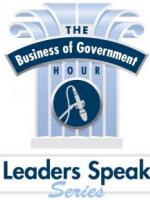
Leaders Speak on Leadership and Public Service: Dr. Kathleen Merrigan and Linda Gibbs

For a decade, The Business of Government Hour has brought you leading government executives who are changing the way government does business. Each week, our guests join us for an informative, insightful, and in-depth conversation about their careers, their agencies, agency accomplishments, as well as their vision of government in the 21st century. Over last five years, we have interviewed more than 350 government executives. It is from this rich library that we have culled together their insights on important public management issues.
In another installment of the Leaders Speak Series, I bring you a sampling of current government leaders and their advice on leadership and public service. What makes an effective leader? Why pursue a career in public service? Our guests offer their extended reflections on such questions.
Dr. Kathleen Merrigan, deputy secretary at the U.S. Department of Agriculture explains how her academic experience made her think differently about leadership and the importance of public service: 
- What I learned change from my graduate students at Tufts University changed my perspective. All of my students read online. They get their news in different ways through social media. It just really opened my eyes. I realized that if I was going to lead an institution made up of my generation, but also younger people too, I was going to have to think differently.
- As an undergrad, I was mentored by James MacGregor Burns who wrote a very well-known book on leadership. He talks about transactional leadership, transformative leadership.There are all these different kinds of models and books to read, but really, right now, I’m focused on the younger generation, bringing them into USDA and bringing them into American agriculture.
- What makes a good leader? For me, it’s really trying to empower people around you to speak truth to power. I also think it’s very important to empower people at various levels in the bureaucracy.
- We have this task force now we called Know Your Farmer, Know Your Food. I basically said to agency administrators, I want the people who want to be there. I don’t care what their rank is, what their background is, I want enthusiasm, I want people who are ready to add this to their current workload, not as a burden, but as a joy.
- There’s nothing more rewarding than working in the public sector, knowing what you do really matters to people and changes lives.
Linda Gibbs, deputy mayor of Health and Human Services for the City of New York on the importance collaboration plays in her leadership style as well as the gratifying aspects of public service: 
- There are many different types of effective leadership. I really believe in collaboration. I feel like I make the best decisions when I have as many different points of view around the table as possible and consider a lot of different opinions
- What you get with that kind of input is that you get wiser decisions. You get more knowledge and smarter decisions, but you also get the buy-in of the people that you need in order to make the change happen.
- Particularly, when you’re overseeing critically important services, it’s not just about having good ideas. It’s about actually implementing those ideas, getting them off the ground, and making them run effectively and efficiently.
- Half of the task of leadership is identifying the best ideas. The other half is effectively implementing those ideas and making them real. To me, a collaborative process that brings as many people to the table is vital and that requires critical leadership necessary to make that happen.
- The work we do is incredibly inspiring and fulfilling. I think that the payback is not going to come in getting rich or having the best stuff. You have to have thick skin because you’ll get criticized for all the bad things that happen and rarely get praised for the good things. It’s just really nice to be part of improving services and helping to make people’s lives better -- that’s what makes it incredibly fulfilling, gratifying, and inspiring



